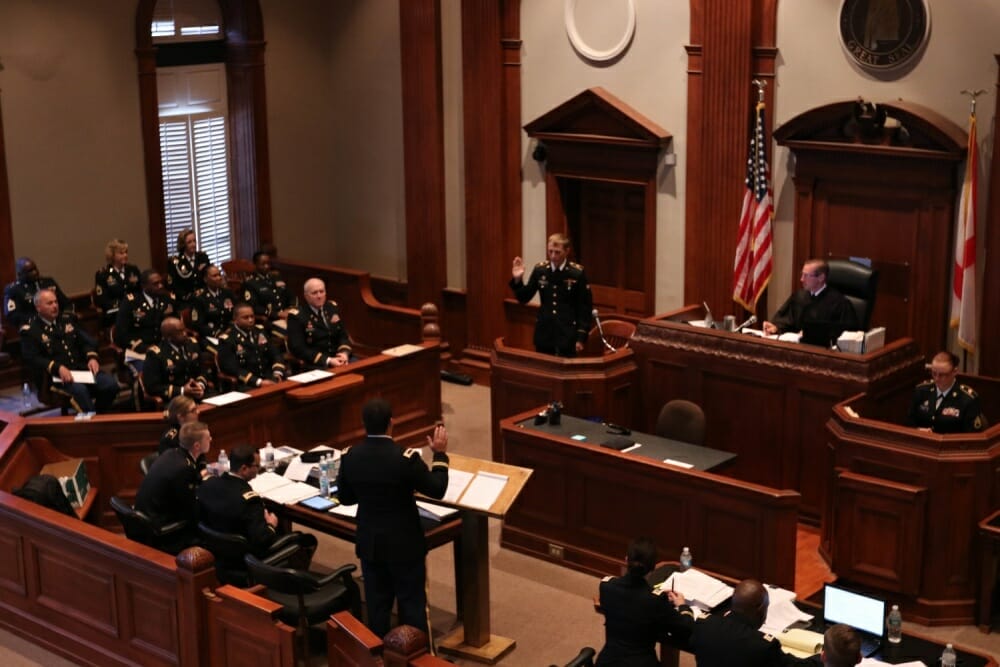A court-martial is very much like any criminal trial in America, but unless you’ve been through the process, that still leaves you asking what happens when you are court-martialed. The court-martial process can be long. It starts with an investigation that can take many months. Once that concludes, high-level commanders decide whether to order you to a court-martial. Once you are actually charged and those charges are “referred” to the court-martial, the real process begins. It can take somewhere between 6 weeks to 6 months to actually get to trial once those charges are “referred”.
Early Steps in a Court-Martial
In the weeks or months leading up to a court-martial, there are many stages that your attorney will guide you through. There are even more pieces of logistics that your attorney and their team are handling without your knowledge. A court-martial is like any major event where the key to success often is found in the quiet preparation that happened well ahead of time
Discovery in a Court-Martial
At the beginning of the court-martial process, your attorneys will request “discovery” which is their opportunity to receive any documents in the possession and control of the Government. This is an extremely important stage, and experienced counsel will know exactly what to ask the prosecutors provide. This can make or break a case because the documents gathered during discovery are often the matters that lead to damning in-court contradictions of witnesses.
Preliminary Motions Hearing in a Court-Martial
Several weeks before trial, there is usually a preliminary hearing to bring “motions” to the judge. A motion is a written legal document that requests the judge to do something; which can include anything from limiting certain evidence from coming into the trial, to forcing the Government to take certain actions like producing experts or document, to dismissing some or all of the charges in the case. There is no way to describe the importance of this stage of the court-martial. These are the items that will forever shape the trial, and will be the primary grounds for appeal if you are convicted. There are a lot of civilian counsel that just hand this duty off to the military defense counsel. You MUST ask a civilian counsel if they will be the ones handling motions before making the decision to hire.
Final Pre-Trial Preparation
After motions the final preparations for trial begin. This could include witness interviews, final strategy decisions, and preparations of the client to potentially testify. This is an extremely time consuming and intense process. Our attorneys often interview necessary witnesses weeks or months ahead of trial, but in the final days before trial, many things can change, including witness testimony. Our attorneys arrive at trial days before the trial when necessary to do final interviews and handle last-minute legal issues.
The Court-Martial Process
Finally, the day for trial comes. The first thing will be the selection of the jury. Your attorney will have the opportunity to ask questions or have the judge ask questions of the members to make sure you have the most fair members possible. After the jury is selected, the trial begins with opening statements, examination of witnesses, to include grueling cross examinations of key witnesses, and then finally closing arguments. The entire trial could take between a couple days to a couple weeks with most trials lasting 3-5 days. As simple as this chain of events sound, experience and expertise are the keys to success. It is an extremely fast moving series of events and everything is on the line.
When the trial is over, the jury deliberates and then announced a verdict. As that verdict is read off, the fate of the rest of the client’s life is determined. There are no easy cases. There are no verdicts that are guaranteed. The conviction rate in the military seems to climb and climb as do the sentences that are given. After that verdict is read, we’ve never had a client say they regretted hiring us.
How long does a court-martial trial take?
A court-martial trial usually takes between two and six days, during which there will be a jury selection, opening statements, examination and cross-examination of witnesses, closing arguments, deliberations, announcement of findings, and the sentencing phase if there is a conviction.
The entire court-martial process is much longer. Investigations can take anywhere from weeks to many months, even a year, before commanders decide to take a case to court-martial. Once the case is ordered to go to a court-martial and that process takes anywhere from 6 weeks to 6 months, typically. During that time, there are a number of pretrial matters and preparations that require intense attention to detail from the attorneys.






